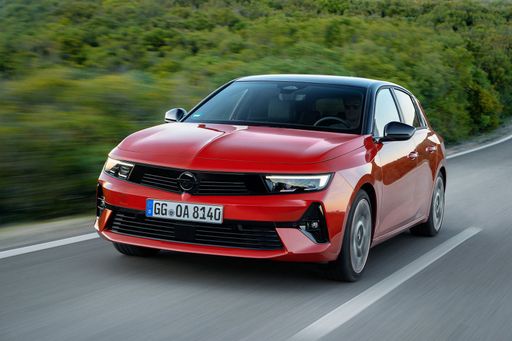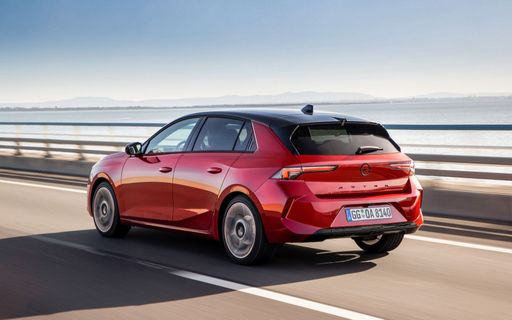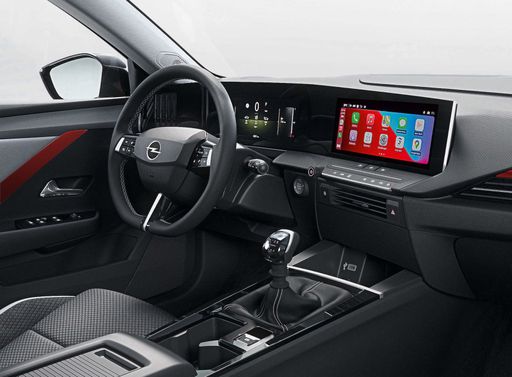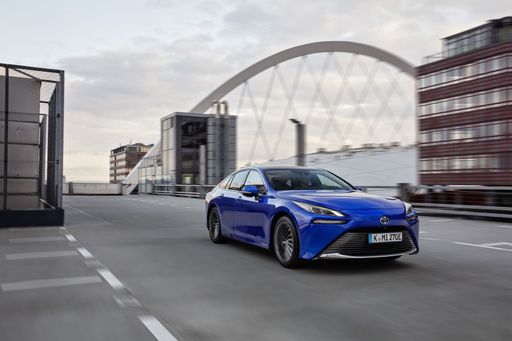Vauxhall Astra VS Toyota Mirai – Specs, Efficiency & Price Comparison
Which model is the better choice – the Vauxhall Astra or the Toyota Mirai? We compare performance (225 HP vs 182 HP), boot capacity (422 L vs 300 L), efficiency (15.60 kWh1.30 L vs ), and of course, the price (25000 £ vs 58700 £).
Find out now which car fits your needs better!
The Vauxhall Astra (Hatchback) is powered by a Petrol, Diesel, Plugin Hybrid, Electric or Petrol MHEV engine and comes with a Manuel or Automatic transmission. In comparison, the Toyota Mirai (Sedan) features a Hydrogen engine and a Automatic gearbox.
When it comes to boot capacity, the Vauxhall Astra offers 422 L, while the Toyota Mirai provides 300 L – depending on what matters most to you. If you’re looking for more power, you’ll need to decide whether the 225 HP of the Vauxhall Astra or the 182 HP of the Toyota Mirai suits your needs better.
There are also differences in efficiency: 15.60 kWh1.30 L vs . In terms of price, the Vauxhall Astra starts at 25000 £, while the Toyota Mirai is available from 58700 £.
Compare all the key specs now and find out which model fits your lifestyle best!
Vauxhall Astra
The Opel Astra exudes a sleek and modern design, making it a standout choice in the compact car segment. Its interior is thoughtfully crafted, providing both comfort and cutting-edge technology for an enhanced driving experience. The vehicle is also celebrated for its efficient performance, adeptly balancing power with fuel economy to suit urban and long-distance journeys alike.
details @ www.media.stellantis.com
@ www.media.stellantis.com
 @ www.media.stellantis.com
@ www.media.stellantis.com
 @ www.media.stellantis.com
@ www.media.stellantis.com
Toyota Mirai
The Toyota Mirai represents a groundbreaking step in hydrogen fuel cell technology, offering an eco-friendly alternative to traditional petrol engines. Its sleek design and futuristic aesthetic make it a standout on the road, while the interior combines comfort with cutting-edge features. With its impressive range and quick refuelling capabilities, the Mirai is paving the way for the future of sustainable motoring.
details @ Toyota
@ Toyota

|

|
|
|
|
Costs and Consumption |
|
|---|---|
|
Price
25000 - 40500 £
|
Price
58700 - 66700 £
|
|
Consumption L/100km
1.3 - 6 L
|
Consumption L/100km
-
|
|
Consumption kWh/100km
15.60 kWh
|
Consumption kWh/100km
-
|
|
Electric Range
57 - 418 km
|
Electric Range
650 km
|
|
Battery Capacity
11.3 - 51 kWh
|
Battery Capacity
-
|
|
co2
0 - 135 g/km
|
co2
-
|
|
Fuel tank capacity
42 - 52 L
|
Fuel tank capacity
5 L
|
Dimensions and Body |
|
|---|---|
|
Body Type
Hatchback
|
Body Type
Sedan
|
|
Seats
5
|
Seats
5
|
|
Doors
5
|
Doors
4
|
|
Curb weight
1341 - 1736 kg
|
Curb weight
1900 - 1930 kg
|
|
Trunk capacity
352 - 422 L
|
Trunk capacity
300 L
|
|
Length
4374 mm
|
Length
4975 mm
|
|
Width
1860 mm
|
Width
1885 mm
|
|
Height
1432 - 1488 mm
|
Height
1470 mm
|
|
Payload
444 - 509 kg
|
Payload
485 - 515 kg
|
Engine and Performance |
|
|---|---|
|
Engine Type
Petrol, Diesel, Plugin Hybrid, Electric, Petrol MHEV
|
Engine Type
Hydrogen
|
|
Transmission
Manuel, Automatic
|
Transmission
Automatic
|
|
Transmission Detail
Schaltgetriebe, Automatikgetriebe, Automat. Schaltgetriebe (Doppelkupplung)
|
Transmission Detail
-
|
|
Drive Type
Front-Wheel Drive
|
Drive Type
Rear-Wheel Drive
|
|
Power HP
130 - 225 HP
|
Power HP
182 HP
|
|
Acceleration 0-100km/h
7.5 - 10.6 s
|
Acceleration 0-100km/h
9.20 s
|
|
Max Speed
170 - 235 km/h
|
Max Speed
175 km/h
|
|
Torque
230 - 360 Nm
|
Torque
300 Nm
|
|
Number of Cylinders
3 - 4
|
Number of Cylinders
-
|
|
Power kW
96 - 165 kW
|
Power kW
134 kW
|
|
Engine capacity
1199 - 1598 cm3
|
Engine capacity
-
|
General |
|
|---|---|
|
Model Year
2023 - 2025
|
Model Year
2021 - 2022
|
|
CO2 Efficiency Class
D, B, A, C
|
CO2 Efficiency Class
-
|
|
Brand
Vauxhall
|
Brand
Toyota
|
Vauxhall Astra
Opel Astra: A Legacy of Innovation and Technology
The Opel Astra has been a staple in the automotive market, continuously evolving to integrate cutting-edge technology and innovation. The latest versions of the Astra model continue this tradition, offering a range of engine types and an array of features designed to enhance driving performance and efficiency.
A Comprehensive Range of Powertrains
The latest Opel Astra models boast a selection of advanced powertrains, providing options for every type of driver. From the efficiency-oriented Mild-Hybrid engines to the cutting-edge fully electric variants, the Opel Astra is tailored to meet diverse customer needs. Car enthusiasts can choose from petrol, diesel, and hybrid engine types, with power outputs ranging between 110 PS and 225 PS, ensuring both efficiency and performance.
Sustainability Meets Performance
In an era where sustainability is paramount, the Opel Astra makes significant strides with its eco-friendly models. The Plug-In Hybrid options within the range offer an impressive fuel consumption rate of just 1.3 L/100km, highlighting Opel's commitment to reducing carbon footprints. Furthermore, the fully electric Astra model boasts an extended range of up to 418 km, catering to the growing demand for zero-emission vehicles.
Advanced Driving Dynamics
The Opel Astra is not just about power; it also offers an exceptional driving experience. With advanced gear options such as automatic transmissions and fine-tuned manual gearboxes, the Astra ensures smooth transitions and responsiveness. The front-wheel-drive configuration provides balanced handling, making it suitable for various driving conditions.
Technology and Features Galore
Opel has equipped the Astra with a myriad of technological advancements aimed at enhancing the driving experience. Cutting-edge infotainment systems, driver-assistance features, and comfortable interiors make every journey enjoyable. Buyers can also choose from multiple trim levels to personalise their Astra, ensuring it fits their lifestyle perfectly.
A Versatile and Stylish Design
The Opel Astra's sleek and modern design makes a bold statement on the road. With dimensions of 4,374 mm in length and a width of 1,860 mm, the Astra strikes a confident pose. Despite its compact build, the hatchback offers ample interior space, including a boot capacity ranging from 352 to 422 litres, embodying practicality without compromising on style.
Value for Money
Starting at a competitive price range between 27,910 € and 47,260 €, the Opel Astra offers excellent value for its array of features and performance capabilities. Its cost-effectiveness is also evident in the monthly operational costs, making it an attractive option for consumers looking for a reliable and cost-efficient vehicle.
The Opel Astra continues to set benchmarks in the compact car segment, effortlessly blending innovation, sustainability, and performance. With its range of versatile powertrains and cutting-edge technology, the Astra is poised to meet the demands of modern drivers while contributing to a greener future.
Toyota Mirai
The Future of Driving: Introducing the Toyota Mirai
The Toyota Mirai represents a significant leap forward in automotive innovation, being one of the leading vehicles in the hydrogen fuel cell market. As we continue to search for sustainable transportation solutions, the Mirai stands out with its pioneering technology and exceptional driving features.
Revolutionary Hydrogen Fuel Cell Technology
At the heart of the Toyota Mirai is its groundbreaking hydrogen fuel cell system. Unlike conventional internal combustion engines, the Mirai uses a fuel cell stack to generate electricity through the chemical reaction between hydrogen and oxygen. This process not only powers the car with zero emissions—producing only water vapour as a byproduct—but also delivers a smooth and silent drive.
Technical Specifications and Performance
The Toyota Mirai is designed with performance in mind. It boasts a power output of 182 PS (134 kW) and delivers a robust 300 Nm of torque, allowing it to accelerate from 0 to 100 km/h in just 9.2 seconds. While its top speed is a respectable 175 km/h, it's the Mirai's impressive range that really stands out. The vehicle can travel up to 650 km on a single hydrogen fill-up, making it a practical choice for long-distance travel.
Sophisticated Design and Comfort
Designed as a saloon, the Toyota Mirai combines aesthetic appeal with comfort. Its dimensions—4975 mm in length, 1885 mm in width, and 1470 mm in height—provide a spacious interior for five passengers. The design is sleek and modern, reflecting its advanced engineering. The boot offers 300 litres of storage, suitable for everyday needs.
Advanced Features and Safety
The Toyota Mirai doesn't just excel in propulsion technology; it also includes a range of advanced features to enhance driver comfort and safety. Available in three trims—Advanced, Executive, and Luxury—the Mirai includes state-of-the-art safety systems and infotainment options to ensure a connected and secure driving experience.
Cost and Efficiency
While the price of the Toyota Mirai ranges from €65,990 to €76,290, its monthly running costs—estimated between €1,496 and €1,672—and per kilometre costs of 59.9 to 66.9 cents, reflect the efficient nature of hydrogen-powered vehicles. Considering its innovative technology, the Toyota Mirai offers excellent value for those looking to invest in the future of eco-friendly transport.
The Toyota Mirai: Driving Towards a Sustainable Future
Overall, the Toyota Mirai is more than just a car; it's a vision for the future of sustainable transportation. With its cutting-edge hydrogen fuel cell technology, impressive range, and commitment to zero-emissions driving, the Mirai sets a new standard in environmentally conscious car design. Whether you're an eco-enthusiast or just someone seeking a reliable and technological advanced vehicle, the Toyota Mirai is worth considering.
The prices and data displayed are estimates based on German list prices and may vary by country. This information is not legally binding.
